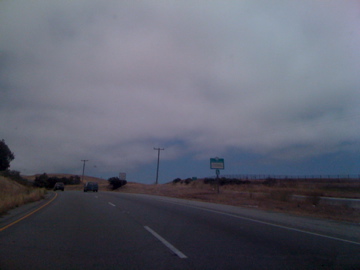
Didn't take a picture of The Keeper. Though he apparently doesn't mind. So here's a Flickr photo instead
His shirt flapped open in the breeze. The stomach was hard, muscles like little knots and skin tough as old leather. Cargo pants and sandals, not-quite-Birkenstocks. Eyes as spooky-clear and sharp as the river water, blazing from behind a scraggle of hair: shoulder-length gray and a light-socket beard that seemed reminiscent of those old miner photos, made you wonder if he wasn’t the descendant of some wayward band of them, a man born into the wrong era, or the last living vestige of an era that’s dying, been dying, might already be dead.
“He’s a dyin bread, for sure,” Alicia said as we tromped over the dirt path, stepping sideways so our worn old sneakers wouldn’t skid us into patches of poison oak. “Like a real-life troll gate keeper.”
Backpacks and coolers and limp plastic flotation devices—we were rolling 22-deep, a smattering of tattoos and a trail of cigarette smoke rode up from Oakland for an annual camping trip.
I could glimpse the river from the path: slick green between these flat, broad boulders, like a long line of really crooked molars. It was hot—Northern California hot, which isn’t really that hot—and each spot I saw along that Yuba River looked perfect, picturesque, a postcard of Sierra-Foothills pristine.
“The best spot is further down,” Chummy called back. “But we gotta to pay The Keeper.” And he smiled at the joke and people called out “Keeee-per” and we laughed.
“It’s the OG dude,” they’d explained, “that’s got one of the best swimming spots on the river on his property. There’s a fence and shit, a sign telling you you’re on private property, but you keep walking down and you get to this shack he built down there, where he lives and is always kinda hanging out. And you give him a couple beers or some weed or something, and listen to him talk for awhile, and he lets you pass.”
“I once took a photo of him,” Matt had said, “that I was gonna mail him, to some PO Box he’s got somewhere. I never did,” shrugged, “but he wrote the address down on one of those discharge papers they give you in jail—you know, we’re they’ve written down everything you have in your pockets and shit. It was all like: ‘$1.17 in change, a bus ticket, a pint of gin…’ Homeboy’d just gotten out of the drunk tank like the night before.”
“That guy is cool as shit,” Moe’d added, grinning. “The Keeper.”
And we tromped and skidded down, and sure enough: a wooden shack and the sharp glare off a tin roof and a gang of chickens clucking and a grizzlied old man standing in a semi-squat hollering at it all.
It seemed like a continuous stream of somewhat-intelligible drunk babble that we’d happened to walk in on—I could imagine him going on and on, with or without an audience, talking to himself and the chickens and the rocks and the river that didn’t ever stop flowing either.
“See that there,” pointed to a little fenced-in patch of green, “I call that My Feeble Attempt To Grow Something,” and yowled in laughter. A rooster yodeled back, as though in response. “Here you can hear the roosters crow all day long, yep. I been here, watching this tryin to grow—” pointed at the green again “—and haven’t left in damn near three weeks. Just had some people passin through to give me a few beers and some LSD from time to time and that’s all I need to live, you know what I’m sayin?”
Sadie opened her bag and handed him a few cold beers.
“Well alright, alright,” The Keeper said, nodding. “You are officially no longer tourists, you are guests, welcome. The only rules are that you bring back your cans and that you remember to come back, cause—” a pause here “—if you didn’t, it’d break my heart.”
“Yessir!”
“Keep coming back, it works!” The Keeper called out and laughed as we shuffled by. “And be careful on the rocks, watch your step—these are the most difficult steps you might take. Twelve steps, my own twelve steps,” and howled again in laughter, a not-quite-crazy kind of laughter that got swallowed by the rocks and the river and passing of the river, as we marched on to our swimming spot.













Recent Comments